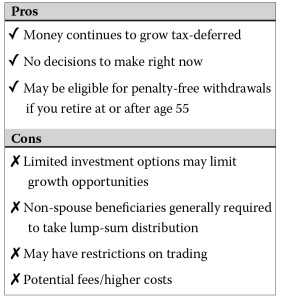Jason B.
Miyashita
Senior vice president, investments
Senior institutional consultant
Asia Pacific Group of Raymond James
Many people who change employers or retire leave their assets in the former employer’s 401(k) plan. Often they are not aware of other options and how these choices can impact their long-term goals. While you were employed, you had limited options with your retirement account. Now you have the freedom to consider many more investment options.
One option is to roll assets into an Individual Retirement Account where you can invest in just about any type of investment. Let’s review the options available when you leave an employer, change jobs or retire. You may be surprised to learn how many choices you have.
Consult with your financial adviser about the advantages of rolling over retirement assets into a traditional or Roth IRA. There are many factors involved and steps that must be implemented correctly in order to make the most of your rollover decision.
Option 1: Leave the money in the plan
 Option 2: Take as cash
Option 2: Take as cash Option 3: Roll over to a new employer’s plan
Option 3: Roll over to a new employer’s plan Option 4: Roll over to a traditional IRA
Option 4: Roll over to a traditional IRA Option 5: Roll over to a Roth IRA
Option 5: Roll over to a Roth IRA
If you are changing jobs, or even retiring, you can roll over the following types of retirement plans into a traditional IRA on a tax-free basis. Talk to your financial advisor to see if a rollover is best for your situation:
- Pre-tax qualified plans, including 401(k)
- Pre-tax 402(b)
- Pre-tax 457(b)
- SIMPLE IRA (after two years)
- SEP-IRA
You can roll over assets from the following types of plans into a Roth IRA on a tax-free basis:
- Roth qualified plans, including a 401(k)
- Roth 402(b)
- Roth 457(b)
Unless certain criteria are met, Roth IRA owners must be 59½ or older and have held the IRA for five years before tax-free withdrawals are permitted. Additionally, each converted amount is subject to its own five-year holding period. Investors should consult a tax advisor before deciding to do a conversion.
— The information contained herein has been obtained from sources considered reliable, but we do not guarantee that the foregoing material is accurate or complete. Investing involves risk and investors may incur a profit or loss.













